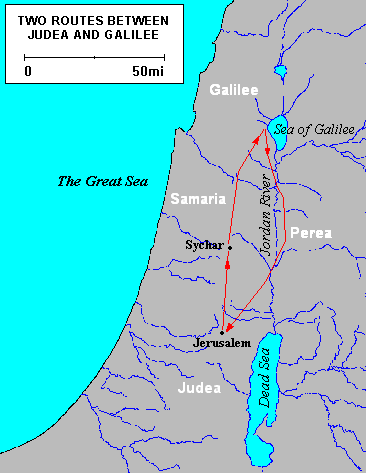What I Noticed Today (John 2-4)
John 2
Sign 1. Turning water into wine.
In verses 2:1-11 (Day 7), the wedding at Cana and Jesus’ first miracle. Jesus, his mother, and the disciples attended a wedding in Cana. When they ran out of wine, Jesus’ mother told the servants to “do whatever He tells you.” Jesus had the servants fill several large storage jars with water which He then turned into wine.
Note: The reference to “On the third day” is likely counted from Philip and Nathaniel’s encounter with Jesus.
Note: John specifically used the Greek word for “signs” rather than the word for “miracles” to focus on the significance of Jesus’ actions.
Note: Each of the six large storage jars held 20-30 gallons of water so the total amount of water turned into wine could be as much as 180 gallons.
In verse 12, Jesus, the disciples, and Jesus’ mother and His brothers went to Capernaum where they stayed for a few days.
John 2:13-3:21
Jesus begins His ministry in Jerusalem.
In verses 13-25, the Passover was near so Jesus went to Jerusalem where he found people selling animals for sacrifice and money changers in the temple complex. He made a whip out of cords and drove the animals out and overturned the tables of the money changers. He ordered them all to leave because they had turned His Father’s house into a marketplace.
Note: The reference to the temple complex is specifically the Court of the Gentiles. They made their money by selling animals for sacrifice at premium prices and exchanged Roman money for Temple money at high exchange rates.
The Jews challenged Jesus’ authority to do this. Jesus answered, destroy this temple and I will raise it up in three days. The officials thought He was talking about the physical temple, but Jesus was referring to His body being raised from the dead after three days.
While He was in Jerusalem, many people came to believe in Him when they saw the signs He did, but He did not entrust Himself to them.
Note: Jesus knew their hearts. Many believed he was a great healer because they saw signs but they did not understand He was their savior.
John 3
In verses 1-21, John relates a meeting between Jesus and Nicodemus. Nicodemus was a teacher (Rabbi), a Pharisee, and a member of the Sanhedrin, the Jewish ruling council.
Nicodemus visited Jesus at night addressing Jesus as Rabbi and acknowledging no one could do what He was doing without God’s power. Jesus told Nicodemus no one could enter the kingdom of God unless they are born again, meaning born of the water and the Spirit.
Note: There are a number of different interpretations to the phrase “born of water and spirit.” My preference is the Water refers to the repentance ministry of John the Baptist while Spirit refers the Holy Spirit coming to the individual. Assuming this meaning, Jesus was telling Nicodemus he needed to repent and be regenerated by the Holy Spirit.
Nicodemus asked about this spiritual transformation, and Jesus said you are a teacher of Israel and you don’t know? Jesus said, “We speak what We know, We testify to what We have seen, but you do not accept Our testimony.”
Note: The “We” and “Our” in verse 11 are all first-person plural.
Jesus said no one has ascended into heaven except the Son of Man who descended from heaven. Everyone who believes in the Son of Man will have eternal life. For God so loved the world he gave His one and only Son so that everyone who believes in Him might have eternal life.
This is the judgment that has come into the world. People loved darkness (sin) because their hearts are evil. They avoided the light (Christ) so they would not be exposed.
In verses 22-30, John includes the final testimony of John the Baptist. Jesus and His disciples went to the Judean countryside where He baptized many. John the Baptist went to Aenon near Salim to baptize. John was baptized by John the Baptist (he had not yet been thrown in prison).
A dispute arose between John’s disciples and a Jew regarding purification. It seems John’s disciples were concerned that everyone was flocking to Jesus. John the Baptist said he was not the Messiah; that he was sent ahead of the Messiah to make way for Him. He was the groom’s friend, not the groom. He must decrease while Jesus must increase.
Note: The reference to the groom in a wedding suggests John the Baptist saw himself as the groom’s assistant; the person who got things ready for the groom.
In verses 31-36 the One who comes above is above all. He testifies to what He has seen and heard, yet no one believes Him. Those who accept His testimony are affirming the truth of God because they have the Holy Spirit. The Father loves the Son and has given all things into His hands. Anyone who believes in the Son has eternal life. Anyone who rejects the Son will face the wrath of God.
Some thoughts for further consideration:
- Many of the Jews hung around Jesus to witness the signs and receive healings, but they failed to understand what or who he truly was. Even when He taught them about the Son of God come to save the world they rejected Him. They had eyes but could not see, and ears but could not hear!
John 4
John 4:1-4:42: John describes Jesus’ ministry in Samaria.
In verses 1-4, knowing the Pharisees were aware of what He and the disciples were doing, Jesus traveled to Galilee by way of Samaria.
Note: Due to the animosity between the Jews and the Samaritans, Jews would avoid traveling through Samaria if at all possible by taking the longer eastern route that went through Perea (See the map below from the Bible Knowledge Commentary).
In verses 5-6, Jesus arrived in the town of Sychar near the land that Jacob had given to his son Joseph (Genesis 48:21-22). Jesus sat down at Jacob’s well about 6pm.
In verses 7-26, John records a meeting between Jesus and the Samaritan woman. Jesus told the woman about living water and whoever drinks this living water that He gives them will never thirst again. The woman misunderstood thinking Jesus was referring to water in the well but Jesus was talking about quenching her spiritual thirst. The woman was a sinner living with a man, having had five husbands, and was in need of salvation.
Note: The Greek word translated “husband” can also be translated “men.” She may not have been married in the traditional sense at all but had engaged in a series of illicit relationships.
Jesus explained true worship of God was in spirit because God was spirit. The woman acknowledged she knew about Messiah and believed He would explain everything to them. Jesus said I am He, the One speaking to you.
Note: A chart contrasting Jesus’ encounter with Nicodemus and the Samaritan woman is available. Click here.
In verses 27-38, Jesus turns His attention to instructing the disciples.
The disciples arrived just as Jesus finished speaking to the Samaritan woman. She left and went to the village to tell the people she may have met the Messiah.
Meanwhile, the disciples tried to get Jesus to eat, but Jesus said I have food to eat that you don’t know about. The disciples were confused thinking Jesus had gotten food somewhere. But Jesus explained His food was to do the will of the Father. Jesus explained the time for harvest was almost near. The reaper is already gathering fruit for eternal life, so the sower and reaper can rejoice together.
Note: Jesus refers to the disciples as being reapers. Reapers have the joy of bringing in the harvest. The sower makes possible the harvest but has no immediate fulfillment from their work.
In verses 39-42, many people came to believe in Jesus as Messiah because of the woman’s testimony. Jesus stayed with them two more days. Many more believed because of what Jesus said.
Note: The Samaritans came to faith based on a personal encounter with Jesus. This is the first example of Jesus taking the Good News beyond the Jewish nation.
In verses 43-45, Jesus left Samaria for Galilee. The Galileans welcomed Jesus because they had seen what He had done in Jerusalem.
Sign 2. Healing the official’s son.
In verses 46-54, Jesus made it to Cana in Galilee A royal official in Capernaum had a son that was sick. The official went to Jesus and pleaded with Him to heal his son. Jesus rebuked the people for not believing unless they saw signs and wonders. Yet the official pleaded again for his son’s life. Jesus dismissed the official saying your son will live. The official had faith and left on his journey home. On his way, his servants met him and told him his son was healed. When he asked when the boy was healed, he discovered it was the seventh hour, the same time Jesus said he would live. Because of this, the official and his whole household believed.


